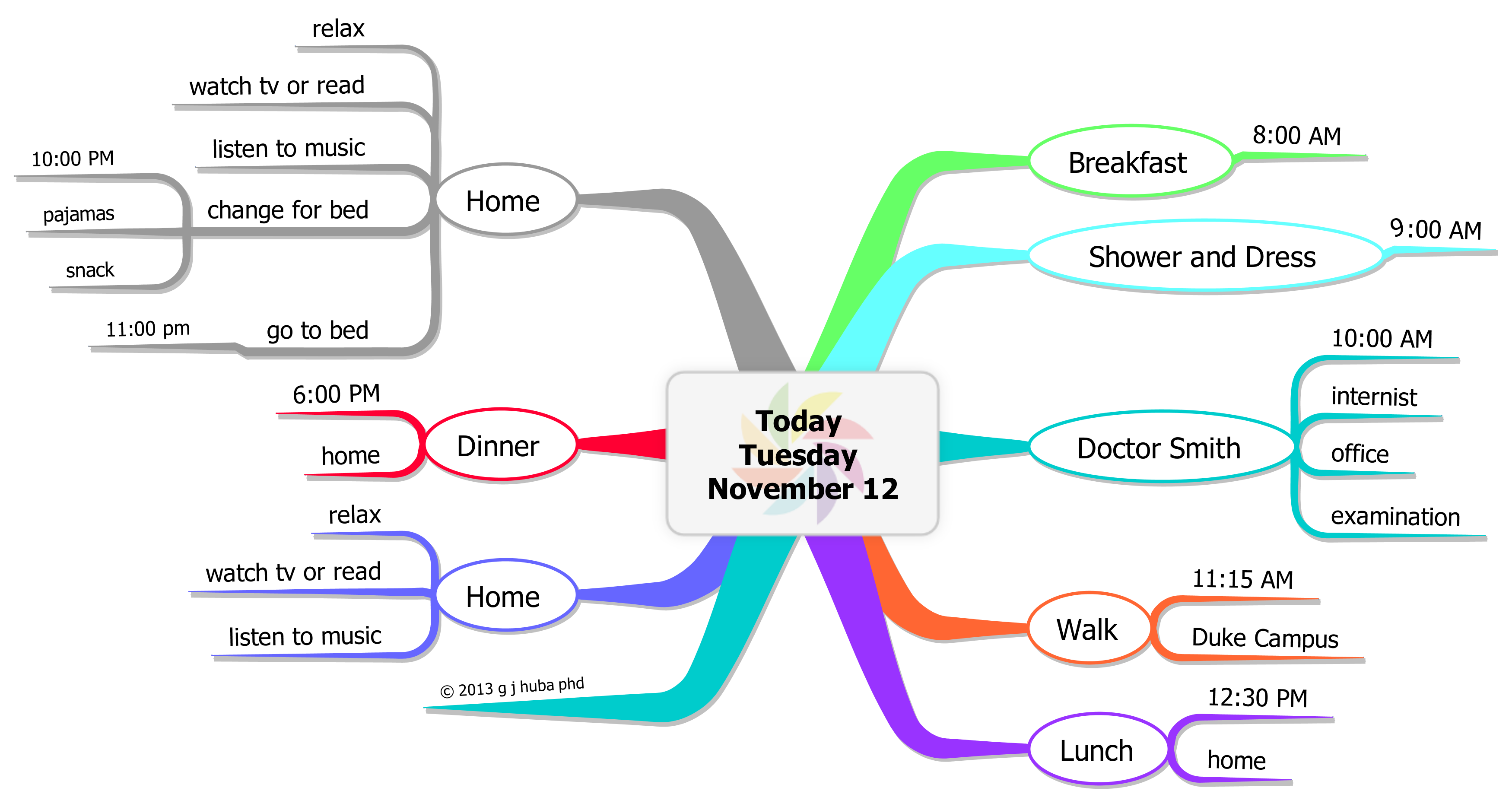This post does not contain medical advice. None of the methods described are known to be therapeutic. What is described are possible note-taking or information-sharing models for patient-client-self management.
For the past few months, I have been focusing on the use of mind maps to assist people with dementia, cognitive impairment, or cognitive decline deal with various issues that arise as they work hard to maintain independence.
You can access those posts simply by using the search box at the bottom of each post with keywords like “dementia” or “cognitive.” Several dozen blog posts will pop up with most very recent.
But the reality is that as dementia or other cognitive problems progress, many patients will require increasing amounts of supervision and care. Mind maps may prove to be useful in assisting a caregiver to help in a more effective, and cost–effective, manner.
- Just as those with cognitive decline may be able to remember, plan, express themselves, and document their lives in maps, caregivers may be able to use these techniques themselves to provide better care and client management. Mind maps may potentially help the caregiver recall the preferences of the client, as well as the client’s life history, important events, significant people, and life style
- Caregivers may find that visual information recorded in mind maps provides a good way for the caregiver and the client to start discussions.
- Caregivers may find that clients can express themselves better with pictures, drawings, doodles than in words.
- Caregivers may find that their own notes from each day are more useful if captured in the format of mind maps.
- Caregivers may find that mind maps may be used for brainstorming by themselves, with healthcare providers, with family members, and with the client ways to organize daily events, select food and clothing, remember medications, and organize social events.
- Caregivers may find it useful to record their own feelings in mind maps as a way of dealing with the emotional and physical stress of caregiving.
- The daily calendar — including doctor visits and other appointments and visitors — may be easier to prepare as a mind map and much more useful to the client.
There are dozens of other ways mind maps might be useful in caregiving. I am going to write many posts on this topic in the next months. For now, here are a few examples with many more to come.
Click on each of the images to expand it.
Preparing a Mind Map (with the help of the client or family members) of the Client’s Preferences.
***
Preparing a Mind Map (with the help of the client or family members) of the Client’s Religious Beliefs.
***
Preparing a Mind Map (with the help of the client or family members) of Things the Client Especially Enjoys.
***
Preparing Mind Maps from the Warning Brochure that Comes with Each Prescription Refill.
OR
***
Preparing a Mind Map of Each Day for Your Use and That of the Client.
***
Technical notes. The sample mind maps here were all prepared in the computer program iMindMap, which I strongly prefer both for the way it facilitates mapping and the way it typically produces maps that can be very useful. There are alternate programs that can be used, although perhaps not with the same level of good results possible with iMindMap. Because the maps will be used by caregivers and clients, they will tend to be most effective if colorful, “bold,” graphically interesting, and with large typefaces all of which are easily done in iMindMap. Acceptable alternatives to iMindMap would be iThoughts, Inspiration on the iPad (but not on the PC or Mac), MindNode, and XMIND, although each of the alternatives will be more difficult to use to produce maps for clients with cognitive decline than is iMindMap. There are free mind map programs available or free demo versions. This is a case, however, where paid versions are far more cost-effective than the free versions or most free programs. There is a second type of mind mapping program more suitable for business purposes (the major one is MindJet MindManager and also MindDomo and MindMeister) than those caregiving applications discussed here.
Related articles
- #CareMaps: Uses of #MindMaps in #Caregiving for Patients with #Dementia, #MCI, and #Neurodegenerative Disorders (hubaisms.com)
- #Dementia and “Typical” #Aging: Examples of (Better???) Ways to Present Online Health Information with #MindMaps (hubaisms.com)
- #Cognitive and #Behavioral Tools for Fighting #CognitiveDecline: A #MindMap (hubaisms.com)







I think that mind-map format might be much more helpful than standard text, in order to facilitate participation by the Person With Dementia. THANKS, George — Tru